‘Mann Ki Baat’ fame Sheikh brothers unique farming Techniques
From giving cheap soil testing facilities to farmers through modern laboratories, doing various experiments on plants
Continuing their ancestral farming, two brothers Bilal and Munir are engaged in making the soil of Kashmir safe and increasing the income of the farmers here. Their speciality in farming techniques is known to everyone in Kashmir who is associated with the progress of agriculture and horticulture. They have converted their home built in the apple orchard from making the best natural vermicompost to the unit of making medicines for the plants. Not only farming techniques, through the modern laboratory built here, they provide cheap soil testing facilities to farmers and conduct various experiments on plants. Their full names are Bilal Ahmed Sheikh and Munir Ahmed Sheikh. They are son of Havildar Ghulam Rasool, who retired after 38 years of service in the Jammu and Kashmir Police. Their brilliant work and passion was mentioned by Prime Minister Narendra Modi himself in his popular program ‘Mann Ki Baat’. This is the first private unit to do such work in Kashmir.
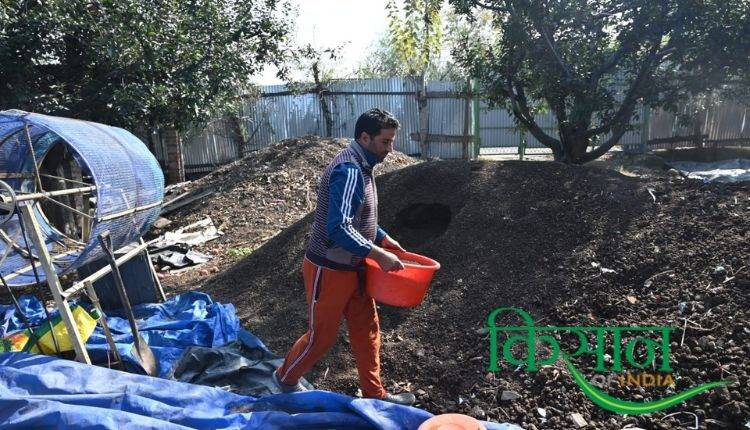
On the outskirts of Muran village, at a distance of about 30-35 km from Srinagar, the capital of the Union Territory of Jammu and Kashmir, is the Sheikh family’s house on the side of the main road. On entering, one can see apple-laden trees and piles of composted manure, closely adjoining each other and covered with tarpaulin. As soon as they crossed them and reached the rear part of the house, it seemed as if they had come to the modern laboratory of some science institute. There are different types of machines, lighting and temperature control devices, medicines, vials, test tubes, oven-like machines and many more things to perform farming techniques. To come to this place, it is necessary that before going inside, take off your shoes at the door and go inside wearing slippers kept there or covering your shoes and slippers with shoe cover. This is similar to what is usually done in hospitals before going to ICU or such sensitive places.
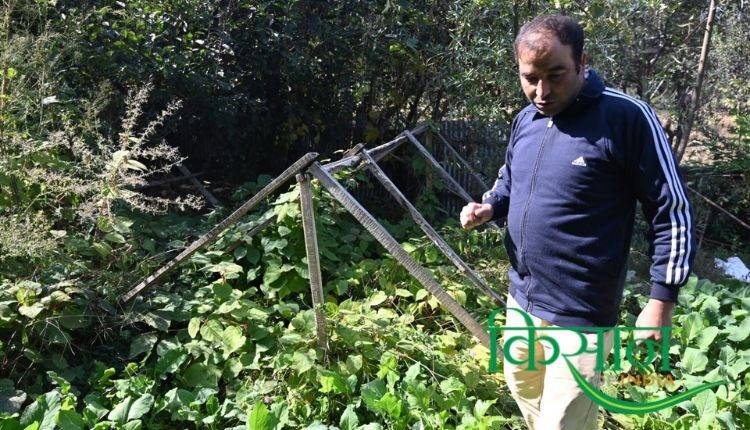
First such lab created
Till the year 2000, the Sheikh family used to cultivate paddy which was based on the natural source of water. Due to climate change and global warming, when the crop did not get the required water at the right time, the yield started decreasing. Then apple was emerging as a good option of income for the farmers of Kashmir. So this family, like many other families, planted apple trees in the paddy fields in 12 kanals. In a few years this work was done. Meanwhile, Bilal Ahmed did his MA, BEd. The aim was to become a teacher and Munir Ahmed, a science student, completed his MSc (Biotechnology). Meanwhile, Munir also did a course in Bio Fertilizer Production from the Center for Micro Biology and Biotechnology Research and Training Institute, Bhopal. In 2017, he set up a soil testing laboratory with the help of the Krishi Vigyan Kendra in Pulwama. For a fee of just Rs 500, this laboratory tests the soil and gives it to the farmers by making a soil card recognized by a government institution. This is the first recognized private laboratory of Kashmir to do such work, which is affiliated to Sher-e-Kashmir University of Agricultural Sciences and Technology. Munir explains that many private laboratories charge farmers 3000 to 5000 rupees for this test.
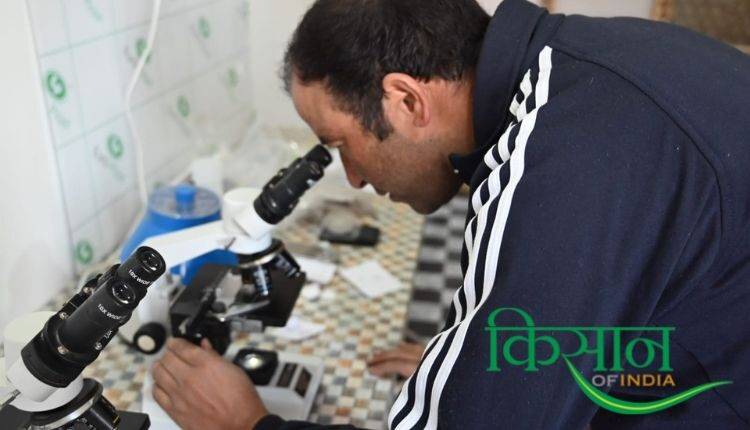
Initially there were many challenges in farming techniques
Bilal and Munir started making vermicompost in 2018. Cow is reared in the house, so cow dung was used in it. After this they started making bio fertilizers. After about 6 years of hard work, they made Trichoderma so that they can launch Bio Control Agent and Stimulator Agent.
Munir explains that the bureaucracy system in doing the work of the high-tech sector continued to suffer because there were many such questions of the government system, which were difficult to satisfy them by answering. Even writing in detail the result or effect of each experiment could not satisfy them. Then those government officers had to be called in the lab and shown everything. There were tests in the lab, for which to get the results, the process had to be completed by putting the sample in the machine continuously for 24 hours or more. These machines run on electricity and many times there was electricity issue in the area. So, they had to spend a lot to set up a solar power plant. Importing machines from outside was very expensive and when such machines were made by Munir himself, it was not easy to get him recognized by the government system here. The second challenge was also that the machine has to be designed in such a way that the power consumption is minimum.
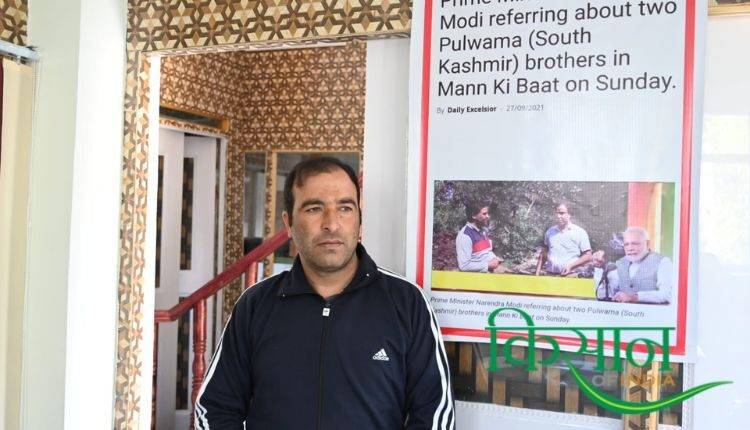
Now people believe their worth
Now researchers also come to Munir’s laboratory. People associated with agriculture science and manure manufacturing come to see his unit. After being mentioned in PM Modi’s program, their popularity has also increased. Munir says that initially people were not interested in compost at all, but it not only helps in increasing the yield of the crop, but also increases the fertility of the soil.
A special thing is also that there are good income prospects for those educated rural youth who have land and have arrangements for cow dung. In the beginning, the Sheikh brothers used their kitchen waste, waste grass and even rotten apples to make vermicompost. They called it just a misunderstanding of the farmers that rotting apples are not used for manure. Earlier they started the work with the help of 2 employees. Now they have given direct jobs to 8 people. At the same time, there is an income of more than 20 people associated with their business.
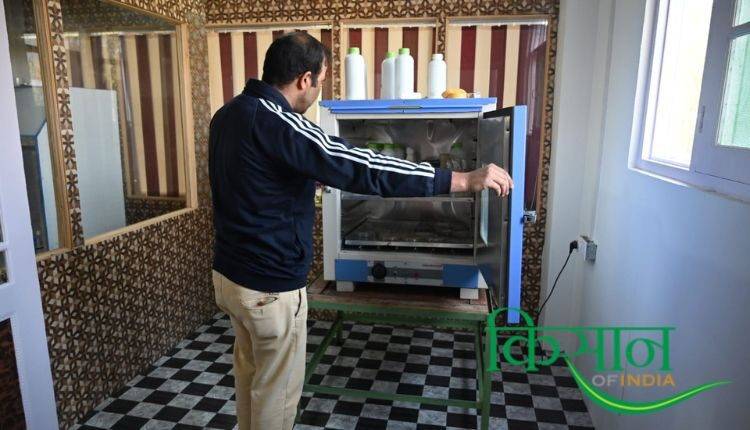
Now giving employment to many
Within a few years, the effect of the awareness among the farmers regarding vermicompost is visible here. Munir says that when he was short of space to make compost, he rented a neighbouring place. At the same time, the Scietific approach of Bilal and Munir is affecting many such young people who used to shy away from the work related to making vermicompost or farming techniques.
Munir says that he also gives training for vermicompost. Also, till now he has got 20 vermicompost sub units installed. On an average, 2 to 5 people get employment in each unit. About 300 tonnes of compost is made, which sells about 50 lakh rupees. Sheikh Bhai also sells ready-made fertilizers of those people because he always has customers ready. Munir says that a trolley full of cow dung is available for Rs 3500. This produces 8 quintals of compost which is sold at Rs 1500 per kg. There are many educated youth among those who have set up the unit on his advice. There is no need for any formalities like registration etc. to make and sell 500 quintals of compost.
New ideas on which work under progress
Munir, who has expertise in making organic fertilizers and organic pesticides, has now started doing some experiments on plants as well. He has started preparing kiwi seedlings from seed. It is said that this can be a source of income for many people who have less land. These plants can even be prepared in pots and sold. A plant sells for Rs 300. It starts giving fruit after two years. Even housewives can do this work. Munir Ahmed Sheikh is also working on a project that allows women to earn some income by making vermicompost from the waste from rural households without incurring any cost.
Also Read: Why Osmanabadi Goat is considered better for meat production?
Contact us – If farmers want to share any valuable information or experiences related to farming, they can connect with us via phone or whatsapp at 9599273766 or you can write to us at “[email protected]”. Through Kisan of India, we will convey your message to the people, because we believe that if the farmers are advanced then the country is happy.
You can connect with Kisan of India on Facebook, Twitter, and Whatsapp and Subscribe to our YouTube channel.



